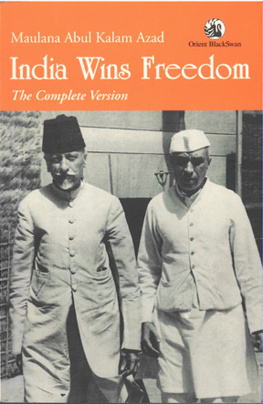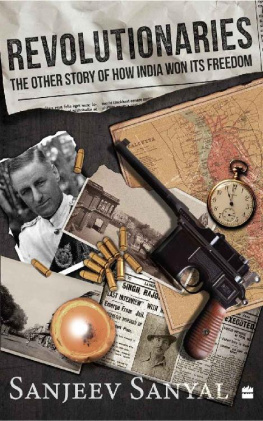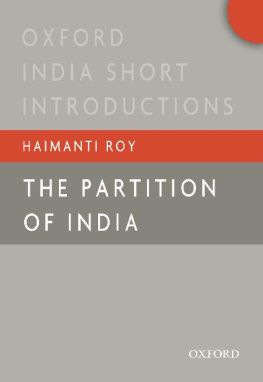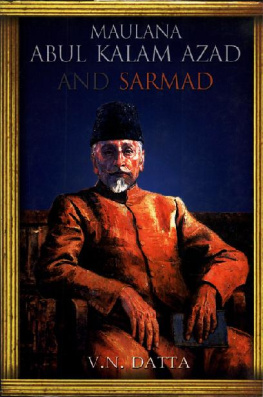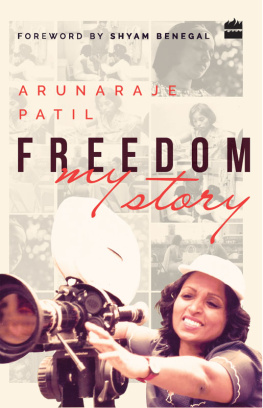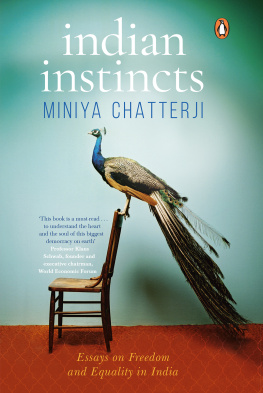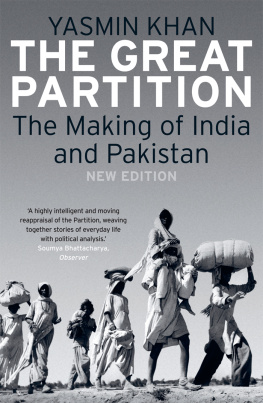MAULANA ABUL KALAM AZAD (18881958) was named Firoz Bakht at birth but was known in his youth as Muhiyuddin Ahmad and later adopted the pseudonym of Abul Kalam Azad. He descended from a family which came from Herat to India in Babar's time and among his ancestors were well-known scholars and administrators. Two years after his birth in 1888 in Mecca where his father Maulana Khairuddin had migrated after the 1857 Revolt, the family moved and settled in Calcutta. Azad was educated at home by his father and private tutors. His political awakening was stimulated by the partition (later annulled) of Bengal in 1905. He travelled extensively in Iraq, Egypt, Turkey and France and had planned to visit London but his father's illness obliged him to return home in 1908.
Maulana Azad started the Urdu weekly Al Hilal at Calcutta in July 1912. He opposed the Aligarh line of remaining aloof from the freedom movement. With the outbreak of war in Europe in 1914, the journal was banned under the Press Act. He then started another Urdu weekly Al Balagh, also from Calcutta, in November 1915, and this continued to be published until March 1916 when Azad was externed under the Defence of India Regulations. The governments of Bombay, Punjab, Delhi and the United Provinces banned his entry, and he went to Bihar. He was interned in Ranchi until 1 January 1920.
After his release Azad was elected President of the All India Khilafat Committee (at the Calcutta session, 1920), and of the Unity Conference at Delhi in 1924. He presided over the Nationalist Muslims Conference in 1928. He was elected President of the Indian National Congress in 1923, and again in 1940, and continued to hold this office until 1946. He led the negotiations on behalf of the Congress Party with the British Cabinet Mission in 1946. Later he joined free India's first government as Minister for Education, a post he held until his death on 22 February 1958.
Among his other published works are Al-Bayan (1915) and Tarjuman-ul-Quran (19331936), which are commentaries, Tazkirah (1916), an autobiographical work and Ghubar-i-Khatir (1943), a collection of letters, all in Urdu.
HUMAYUN KABIR (19061969): After a distinguished academic Career at the Calcutta and Oxford Universities, he served as lecturer first at the Andhra University sit Waltair and then at calcutta University, 193345. In 1937, he was elected to the Bengal Legislative Council as leader of the Peasants Parry. In 1946 Azad selected him to serve as his secretary and he was therefore closely associated with Azad. He served as Educational Advisor to the Government of India until 1956 when he resigned and was elected to Parliament as a member of the Congress Party in 1957. He was appointed Minister for Civil Aviation (195758), for Scientific Research and Cultural Affairs (195863), and for Petroleum and Chemicals (196368). The author of more than twenty books in English and Bangla on philosophy, literature, politics and culture, he also published two novels and three volumes of verse.
INDIA WINS FREEDOM
ORIENT BLACKSWAN PRIVATE LIMITED
Registered Office
3-6-752 Himayatnagar, Hyderabad 500 029 (A.P.), INDIA
Other Offices
Bangalore, Bhopal, Bhubaneshwar, Chandigarh, Chennai,
Ernakulam, Guwahati, Hyderabad, Jaipur, Kolkata,
Lucknow, Mumbai, New Delhi, Noida, Patna
Orient Blackswan Private Limited 1959
The text has been adapted from the original published by
Orient Blackswan in 1988
Reprinted 1989, 1991, 1992, 1993, 1994, 1995, 1997, 1999, 2001, 2003, 2004(twice), 2005, 2006, 2007.
eISBN 978 81 250 4482 6
e-edition:First Published 2011
All rights reserved. No part of this publication may be reproduced, distributed, or transmitted in any form or by any means, including photocopying, recording, or other electronic or mechanical methods, without the prior written permission of the publisher, except in the case of brief quotations embodied in critical reviews and certain other noncommercial uses permitted by copyright law. For permission requests write to the publisher.
for
Jawaharlal Nehru
friend and comrade
Publishers' Note
When the manuscript of India Wins Freedom was handed over to us for publication by the late Professor Humayun Kabir in September 1958, seven months after Maulana Azad's sudden death, we were informed that a fuller version containing additional material of about thirty pages would be made available to us for publication on 22 February 1988, the thirtieth death anniversary of Maulana Azad.
However, when the time came, the handing over of the complete text got delayed because of various issues raised by persons claiming an interest in the matter. These issues were heard by the Calcutta High Court, the Delhi High Court and the Supreme Court, before Justice B.N. Kirpalof the Delhi High Court directed on 29 September 1988 that a copy each of the text deposited in the National Library, Calcutta, and in the National Archives, New Delhi, be handed over to Orient Longman on 29 September 1988. The court further directed that the material should be reproduced without any alteration, after comparing the copies to ensure that they were identical. This has been done.
On examining the material, it became apparent that the additional matter was not just an extra thirty pages as generally believed but was to be found scattered throughout the text. Also, apart from phrases, sentence sequences and series of passages left out of the published text, the original text had been modified at many places by Professor Kabir's editorial intervention (see his note in Appendix 1).
The present edition now gives the full text as found in the copies released to us. Major additions to the earlier version are indicated by asterisks at the beginning and at the end. The 'Prospectus of the First Volume' as published in the first edition has been retained. The appendixes included in that edition have also been reproduced.
October 1988.
Preface to the 1959 Edition
When a little over two years ago I approached Maulana Azad with the request that he should write his autobiography, I never for a moment thought that it would be my melancholy duty to write a preface for the volume. He did not like to talk about his personal life and was at first reluctant to undertake the work. It was with great difficulty that he could be persuaded that, as one of the principal actors in the transfer of power from British to Indian hands, he owed a duty to posterity to record his reading of those memorable times. His reluctance was also partly due to his shattered health. He felt that he needed all his energies to cope with the burden of work imposed on him by inescapable political and administrative tasks. He finally agreed on my assuring him that I would do my best to relieve him of the actual burden of writing. This would of course mean that the Indian people would be denied the privilege of reading his autobiography in his own words. Indian literature in general and Urdu in particular would be the poorer for this, but even a version in English written under his direction would be better than no record at all.
I think it necessary to describe in some detail how the work has been composed. During these last two years or so, I spent on an average an hour or more every evening with Maulana Azad, except on those occasions when I had to go out of Delhi. He was a wonderful conversationalist and used to describe his experiences in vivid terms. I made fairly copious notes and also asked questions for clarification of a point or elicitation of further information. He consistently refused to speak on personal matters, but on all questions relating to public affairs, he spoke with the utmost frankness and sincerity. When I had collected sufficient material for a chapter, I prepared a draft in English which I handed over to him at the earliest opportunity. He read each chapter by himself and then we went over it together. At this stage, he made many amendments by addition and alteration, as well as by omission. We proceeded in this way till I was able to give him the first draft of the completed book in September 1957.

